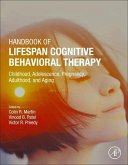Human Performance Optimization
The Science and Ethics of Enhancing Human Capabilities
Herausgeber: Matthews, Michael D; Schnyer, David M
Human Performance Optimization
The Science and Ethics of Enhancing Human Capabilities
Herausgeber: Matthews, Michael D; Schnyer, David M
- Gebundenes Buch
- Merkliste
- Auf die Merkliste
- Bewerten Bewerten
- Teilen
- Produkt teilen
- Produkterinnerung
- Produkterinnerung
Human Performance Optimization: The Science and Ethics of Enhancing Human Capabilities explores current and emerging strategies for enhancing individual and team performance, especially in high-stakes, stressful settings such as the military, law enforcement, firefighting, or competitive corporate settings. Taking a cognitive neuroscience perspective, scientifically grounded approaches to optimizing human performance are explored in depth.
Andere Kunden interessierten sich auch für
![Biological Research on Addiction Biological Research on Addiction]() Biological Research on Addiction192,99 €
Biological Research on Addiction192,99 €![Principles of Addiction Principles of Addiction]() Principles of Addiction192,99 €
Principles of Addiction192,99 €![Biopharmaceutical Processing Biopharmaceutical Processing]() Biopharmaceutical Processing369,99 €
Biopharmaceutical Processing369,99 €![Handbook of Lifespan Cognitive Behavioral Therapy Handbook of Lifespan Cognitive Behavioral Therapy]() Handbook of Lifespan Cognitive Behavioral Therapy247,99 €
Handbook of Lifespan Cognitive Behavioral Therapy247,99 €![Neuronal Mechanisms of Memory Formation Neuronal Mechanisms of Memory Formation]() Christian Hölscher (ed.)Neuronal Mechanisms of Memory Formation119,99 €
Christian Hölscher (ed.)Neuronal Mechanisms of Memory Formation119,99 €![Medicinal Usage of Cannabis and Cannabinoids Medicinal Usage of Cannabis and Cannabinoids]() Medicinal Usage of Cannabis and Cannabinoids248,99 €
Medicinal Usage of Cannabis and Cannabinoids248,99 €![Neurobiology and Physiology of the Endocannabinoid System Neurobiology and Physiology of the Endocannabinoid System]() Neurobiology and Physiology of the Endocannabinoid System239,99 €
Neurobiology and Physiology of the Endocannabinoid System239,99 €-
-
-
Human Performance Optimization: The Science and Ethics of Enhancing Human Capabilities explores current and emerging strategies for enhancing individual and team performance, especially in high-stakes, stressful settings such as the military, law enforcement, firefighting, or competitive corporate settings. Taking a cognitive neuroscience perspective, scientifically grounded approaches to optimizing human performance are explored in depth.
Hinweis: Dieser Artikel kann nur an eine deutsche Lieferadresse ausgeliefert werden.
Hinweis: Dieser Artikel kann nur an eine deutsche Lieferadresse ausgeliefert werden.
Produktdetails
- Produktdetails
- Verlag: Oxford University Press
- Seitenzahl: 488
- Erscheinungstermin: 29. Januar 2019
- Englisch
- Abmessung: 239mm x 157mm x 27mm
- Gewicht: 808g
- ISBN-13: 9780190455132
- ISBN-10: 0190455136
- Artikelnr.: 54549572
- Herstellerkennzeichnung
- Libri GmbH
- Europaallee 1
- 36244 Bad Hersfeld
- gpsr@libri.de
- Verlag: Oxford University Press
- Seitenzahl: 488
- Erscheinungstermin: 29. Januar 2019
- Englisch
- Abmessung: 239mm x 157mm x 27mm
- Gewicht: 808g
- ISBN-13: 9780190455132
- ISBN-10: 0190455136
- Artikelnr.: 54549572
- Herstellerkennzeichnung
- Libri GmbH
- Europaallee 1
- 36244 Bad Hersfeld
- gpsr@libri.de
Michael D. Matthews is currently Professor of Engineering Psychology at the United States Military Academy. He is a Templeton Foundation Senior Positive Psychology Fellow, Fellow of the Army Chief of Staff's Strategic Studies Group, and author of Head Strong: How Psychology is Revolutionizing War (Oxford University Press, 2014.) David M. Schnyer is a Professor in the Department of Psychology and the Institute for Neuroscience at the University of Texas, Austin. He completed a PhD in Clinical Neuropsychology from the University of Arizona. While at the Memory Disorders Research Center at Boston University School of Medicine he was awarded a National Institutes of Health (NIH) K-award in multimodal neuroimaging techniques and trained at the Martinos Center for Biomedical Imaging (MGH). His lab researches the cognitive and neural systems that support memory and attention control in young and old healthy individuals, as well as in persons suffering from mental illness and traumatic brain injury.
* Dedication
* About the Editors
* Contributors
* Contents
* Foreword by Raymond T. Odierno
* Acknowledgments
* 1. Optimizing Human Performance
* Michael D. Matthews and David M. Schnyer
* 2. Metabolic Enhancement of the Soldier Brain
* Karl E. Friedl and Stephen J. Grate
* 3. Nutrition, Genetics, and Human Performance during Military
Training
* Erin Gaffney-Stomberg and James P. McClung
* 4. Molecular and Cellular Aspects of Major Depressive Disorder
* Revathy U. Chottekalapanda, Paul Greengard, and Yotam Sagi
* 5. Computational Approaches to Human Performance in Moderate and
Extreme Settings
* Logan T. Trujillo
* 6. Brain-Computer Interfaces and Neurofeedback for Enhancing Human
Performance
* Ranganatha Sitaram, Andrea Sánchez-Corzo, Mariana Zurita, Constanza
Levican, Daniela Huepe-Artigas, Juan Andrés Mucarquer, and Matías
Ramírez
* 7. Evolution of Physiological Status Monitoring for Ambulatory
Military Applications
* William J. Tharion, Karl E. Friedl, Mark J. Buller, Natalia Henao
Arango, and Reed W. Hoyt
* 8. Neuroprosthetics for Human Performance Optimization
* Yin Jui Chang, Gautam Krishna, and Benito R. Fernández
* 9. Mitigating Stress Response to Optimize Human Performance
* James Ness and Josephine Q. Wojciechowski
* 10. The Role of Sleep in Human Performance and Well-Being
* Nita Lewis Shattuck, Panagiotis Matsangas, Vincent Mysliwiec, and
Jennifer L. Creamer
* 11. Exoskeletons: State-of-the-art, Design Challenges and Future
Directions
* Priyanshu Agarwal and Ashish D. Deshpande
* 12. Enhancing Human Cognitive Capital by Harnessing the Brain's
Inherent Neuroplasticity
* Sandra B. Chapman, Lori G. Cook, Asha K. Vas, and Ian H. Robertson
* 13. Optimizing Cognitive Performance
* Valerie E. Martindale
* 14. Strategies to Improve Learning and Retention During Training
* Henry L. Roediger, III, John F. Nestojko, and Nicole Smith
* 15. Examining the Influence of Adaptive Instructional Techniques on
Human Performance for Tasks Conducted in Extremely Stressful Work
Environments
* Robert Sottilare and Stephen Goldberg
* 16. Non-Cognitive Amplifiers of Human Performance: Unpacking the
25/75 Rule
* Michael D. Matthews, Richard M. Lerner, and Hubert Annen
* 17. Leading Teams to Optimize Performance
* Lissa V. Young
* 18. The Ethics of Human Enhancement: An Overview and Framework
* Janice H. Laurence and Joshua A. Carlisle
* 19. Human Performance Optimization: Synthesis and Integration
* Michael D. Matthews and David M. Schnyer
* Index
* About the Editors
* Contributors
* Contents
* Foreword by Raymond T. Odierno
* Acknowledgments
* 1. Optimizing Human Performance
* Michael D. Matthews and David M. Schnyer
* 2. Metabolic Enhancement of the Soldier Brain
* Karl E. Friedl and Stephen J. Grate
* 3. Nutrition, Genetics, and Human Performance during Military
Training
* Erin Gaffney-Stomberg and James P. McClung
* 4. Molecular and Cellular Aspects of Major Depressive Disorder
* Revathy U. Chottekalapanda, Paul Greengard, and Yotam Sagi
* 5. Computational Approaches to Human Performance in Moderate and
Extreme Settings
* Logan T. Trujillo
* 6. Brain-Computer Interfaces and Neurofeedback for Enhancing Human
Performance
* Ranganatha Sitaram, Andrea Sánchez-Corzo, Mariana Zurita, Constanza
Levican, Daniela Huepe-Artigas, Juan Andrés Mucarquer, and Matías
Ramírez
* 7. Evolution of Physiological Status Monitoring for Ambulatory
Military Applications
* William J. Tharion, Karl E. Friedl, Mark J. Buller, Natalia Henao
Arango, and Reed W. Hoyt
* 8. Neuroprosthetics for Human Performance Optimization
* Yin Jui Chang, Gautam Krishna, and Benito R. Fernández
* 9. Mitigating Stress Response to Optimize Human Performance
* James Ness and Josephine Q. Wojciechowski
* 10. The Role of Sleep in Human Performance and Well-Being
* Nita Lewis Shattuck, Panagiotis Matsangas, Vincent Mysliwiec, and
Jennifer L. Creamer
* 11. Exoskeletons: State-of-the-art, Design Challenges and Future
Directions
* Priyanshu Agarwal and Ashish D. Deshpande
* 12. Enhancing Human Cognitive Capital by Harnessing the Brain's
Inherent Neuroplasticity
* Sandra B. Chapman, Lori G. Cook, Asha K. Vas, and Ian H. Robertson
* 13. Optimizing Cognitive Performance
* Valerie E. Martindale
* 14. Strategies to Improve Learning and Retention During Training
* Henry L. Roediger, III, John F. Nestojko, and Nicole Smith
* 15. Examining the Influence of Adaptive Instructional Techniques on
Human Performance for Tasks Conducted in Extremely Stressful Work
Environments
* Robert Sottilare and Stephen Goldberg
* 16. Non-Cognitive Amplifiers of Human Performance: Unpacking the
25/75 Rule
* Michael D. Matthews, Richard M. Lerner, and Hubert Annen
* 17. Leading Teams to Optimize Performance
* Lissa V. Young
* 18. The Ethics of Human Enhancement: An Overview and Framework
* Janice H. Laurence and Joshua A. Carlisle
* 19. Human Performance Optimization: Synthesis and Integration
* Michael D. Matthews and David M. Schnyer
* Index
* Dedication
* About the Editors
* Contributors
* Contents
* Foreword by Raymond T. Odierno
* Acknowledgments
* 1. Optimizing Human Performance
* Michael D. Matthews and David M. Schnyer
* 2. Metabolic Enhancement of the Soldier Brain
* Karl E. Friedl and Stephen J. Grate
* 3. Nutrition, Genetics, and Human Performance during Military
Training
* Erin Gaffney-Stomberg and James P. McClung
* 4. Molecular and Cellular Aspects of Major Depressive Disorder
* Revathy U. Chottekalapanda, Paul Greengard, and Yotam Sagi
* 5. Computational Approaches to Human Performance in Moderate and
Extreme Settings
* Logan T. Trujillo
* 6. Brain-Computer Interfaces and Neurofeedback for Enhancing Human
Performance
* Ranganatha Sitaram, Andrea Sánchez-Corzo, Mariana Zurita, Constanza
Levican, Daniela Huepe-Artigas, Juan Andrés Mucarquer, and Matías
Ramírez
* 7. Evolution of Physiological Status Monitoring for Ambulatory
Military Applications
* William J. Tharion, Karl E. Friedl, Mark J. Buller, Natalia Henao
Arango, and Reed W. Hoyt
* 8. Neuroprosthetics for Human Performance Optimization
* Yin Jui Chang, Gautam Krishna, and Benito R. Fernández
* 9. Mitigating Stress Response to Optimize Human Performance
* James Ness and Josephine Q. Wojciechowski
* 10. The Role of Sleep in Human Performance and Well-Being
* Nita Lewis Shattuck, Panagiotis Matsangas, Vincent Mysliwiec, and
Jennifer L. Creamer
* 11. Exoskeletons: State-of-the-art, Design Challenges and Future
Directions
* Priyanshu Agarwal and Ashish D. Deshpande
* 12. Enhancing Human Cognitive Capital by Harnessing the Brain's
Inherent Neuroplasticity
* Sandra B. Chapman, Lori G. Cook, Asha K. Vas, and Ian H. Robertson
* 13. Optimizing Cognitive Performance
* Valerie E. Martindale
* 14. Strategies to Improve Learning and Retention During Training
* Henry L. Roediger, III, John F. Nestojko, and Nicole Smith
* 15. Examining the Influence of Adaptive Instructional Techniques on
Human Performance for Tasks Conducted in Extremely Stressful Work
Environments
* Robert Sottilare and Stephen Goldberg
* 16. Non-Cognitive Amplifiers of Human Performance: Unpacking the
25/75 Rule
* Michael D. Matthews, Richard M. Lerner, and Hubert Annen
* 17. Leading Teams to Optimize Performance
* Lissa V. Young
* 18. The Ethics of Human Enhancement: An Overview and Framework
* Janice H. Laurence and Joshua A. Carlisle
* 19. Human Performance Optimization: Synthesis and Integration
* Michael D. Matthews and David M. Schnyer
* Index
* About the Editors
* Contributors
* Contents
* Foreword by Raymond T. Odierno
* Acknowledgments
* 1. Optimizing Human Performance
* Michael D. Matthews and David M. Schnyer
* 2. Metabolic Enhancement of the Soldier Brain
* Karl E. Friedl and Stephen J. Grate
* 3. Nutrition, Genetics, and Human Performance during Military
Training
* Erin Gaffney-Stomberg and James P. McClung
* 4. Molecular and Cellular Aspects of Major Depressive Disorder
* Revathy U. Chottekalapanda, Paul Greengard, and Yotam Sagi
* 5. Computational Approaches to Human Performance in Moderate and
Extreme Settings
* Logan T. Trujillo
* 6. Brain-Computer Interfaces and Neurofeedback for Enhancing Human
Performance
* Ranganatha Sitaram, Andrea Sánchez-Corzo, Mariana Zurita, Constanza
Levican, Daniela Huepe-Artigas, Juan Andrés Mucarquer, and Matías
Ramírez
* 7. Evolution of Physiological Status Monitoring for Ambulatory
Military Applications
* William J. Tharion, Karl E. Friedl, Mark J. Buller, Natalia Henao
Arango, and Reed W. Hoyt
* 8. Neuroprosthetics for Human Performance Optimization
* Yin Jui Chang, Gautam Krishna, and Benito R. Fernández
* 9. Mitigating Stress Response to Optimize Human Performance
* James Ness and Josephine Q. Wojciechowski
* 10. The Role of Sleep in Human Performance and Well-Being
* Nita Lewis Shattuck, Panagiotis Matsangas, Vincent Mysliwiec, and
Jennifer L. Creamer
* 11. Exoskeletons: State-of-the-art, Design Challenges and Future
Directions
* Priyanshu Agarwal and Ashish D. Deshpande
* 12. Enhancing Human Cognitive Capital by Harnessing the Brain's
Inherent Neuroplasticity
* Sandra B. Chapman, Lori G. Cook, Asha K. Vas, and Ian H. Robertson
* 13. Optimizing Cognitive Performance
* Valerie E. Martindale
* 14. Strategies to Improve Learning and Retention During Training
* Henry L. Roediger, III, John F. Nestojko, and Nicole Smith
* 15. Examining the Influence of Adaptive Instructional Techniques on
Human Performance for Tasks Conducted in Extremely Stressful Work
Environments
* Robert Sottilare and Stephen Goldberg
* 16. Non-Cognitive Amplifiers of Human Performance: Unpacking the
25/75 Rule
* Michael D. Matthews, Richard M. Lerner, and Hubert Annen
* 17. Leading Teams to Optimize Performance
* Lissa V. Young
* 18. The Ethics of Human Enhancement: An Overview and Framework
* Janice H. Laurence and Joshua A. Carlisle
* 19. Human Performance Optimization: Synthesis and Integration
* Michael D. Matthews and David M. Schnyer
* Index








